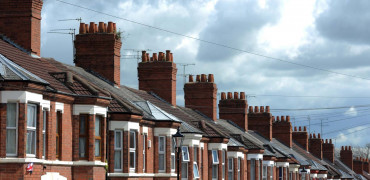The much publicised Government funded boost to the heat pump market appears to have overlooked the needs of the private rental sector, where there is a much higher than average proportion of flats and older terraced properties to upgrade.
It may be a stereotype, but the sub-standard conditions in many rental properties are often characterised by them having a leaking gas boiler that is regularly breaking down and which the landlord refuses to replace – usually citing the high cost of installing a new boiler.
But this is exactly the type of boiler which we should be focussing on getting replaced as a matter of priority, if we are serious about wanting to drastically reduce carbon dioxide emissions from the nation’s housing.
Just over 4.4 million households live in privately rented homes in England, the equivalent of 19 per cent of all households.
This is why there needs to be a strategy aimed specifically at replacing boilers and upgrading heating systems in private rentals.
Our heating systems are responsible for about 21% of the nation’s carbon emissions
An holistic solution is badly needed
Alongside the ageing and inefficient gas guzzling boilers, these properties will typically also suffer from poor insulation, single glazed windows, draughty doors and condensation in many of the rooms.
We therefore need to focus on providing a more holistic solution for these properties that are in such a terrible state of disrepair, if we are to reduce our carbon footprint.
In addition many private rentals do not have the space or facilities to accommodate air source heat pumps, nor do they have large gardens to house ground source heat pumps.
This will inevitably require a revolution in how we plan for and deliver heat networks to millions of homes in towns and cities across the country. Each network can efficiently provide cheap heating to between a few dozen and several thousand properties. They are particularly suited to rental flats.
Although there are over 14,000 heat networks in the UK, these are providing heating and hot water to less than half a million consumers.
Features of the new programme
The Government’s injection of £450 million to help pay for approximately 90,000 heat pumps to be installed into people’s homes from April 2022, has rightly been criticised as being just a small drop in the ocean and to be lacking in ambition, to make the step change necessary to deliver on the net zero carbon target by 2050.
It is also very clearly targeted towards the owners of houses built in the 1970s onwards, which already have decent levels of insulation and double glazed windows throughout.
With heat pumps currently costing considerably more than gas boilers to install, the £5,000 grant (per installation) will bring down the cost to individual homeowners and make heat pumps and gas boilers roughly equal in cost.
Unintended consequences
In the past 20 years the Government’s main focus on the domestic heating market has been on replacing conventional boilers with more fuel-efficient condensing boilers.
It has been a remarkably successful policy drive, which has resulted in almost three quarters of the housing stock (74 per cent) using condensing boilers by 2019, up from just 2 per cent in 2001.
It also meant that by 2019, gas central heating was the most common heating system used in our homes (86 per cent) followed by electric storage heaters (5 per cent) and oil central heating (3 per cent).
This ‘dash for gas’ has also given us heating systems that are responsible for about 21 per cent of the nation’s carbon emissions. This is why it has now become such a focus with climate change so high on our list of priorities.
Scale of the problem
According to the English Housing Survey (EHS), less than one per cent of the English housing stock or just 103,000 dwellings have a heat pump for space and/or water heating.
Of these 103,000 dwellings with a heat pump, 50 per cent were owner occupied, 23 per cent were owned by housing associations and 16 per cent were owned by local authorities.
The proportion of homes with a heat pump in the private rented sector was too small for a reliable estimate to be made in the EHS report. Getting heat pumps installed in these rented homes over the next 10 years represents a significant challenge.
Across the whole of the UK it is estimated that less than a quarter of a million of the country’s 29 million homes currently uses a heat pump to provide our heating and hot water.
Increasing capacity to deliver
In 2019, 27,000 new heat pumps were installed – compared to the 100,000 additional homes connected to the gas network and the 1.7 million replacement boilers installed.
Over 70,000 installations of heat pumps are expected to be made in 2021, but only a small fraction of these are likely to be installed in privately rented properties.
The Prime Minister’s Ten Point Plan for a Green industrial revolution sets out an ambition to install 600,000 heat pumps per year by 2028, while the Scottish Government is targeting a peak of 250,000 renewable heat installations a year in the 2030s, of which the majority are likely to be heat pumps.
Linking to insulation upgrades
Meanwhile the Climate Change Committee suggested that 3.3 million heat pumps need to be installed in our existing homes by 2030, rising to eight million by 2035 to reach net zero targets.
This equates to one million installs per year in new and existing homes by 2030, which suggests that the current level of ambition will need to increase.
The Government has also stated that all private rented sector homes should be improved to EPC band C by 2028 and that ALL homes in the UK should be EPC band C by 2035 where practicable, cost effective and affordable. Currently two thirds of UK homes fall below the average band C, on the rating scale of A to G.
The English Housing Survey tells us the average cost of bringing a privately rented dwelling up to EPC band C is £7,646. The cost of bringing all 2.9 million privately rented dwellings in England (that are currently EPC D or lower) up to EPC band C is a staggering £21.5 billion – over 40 times the amount allocated to installing heat pumps in the next three years.
Gearing up the whole sector
The new money in the Boiler Upgrade Scheme will only pay for replacing less than one per cent of our existing gas and oil-fired boilers.
It is a welcome boost to the Green economy, but needs to be seen as ‘only a small step’. Given its focus on homeowners, we clearly need a complementary scheme for private rentals.
Alongside much, much more money; we also need to see a whole gearing up of the supply and delivery side of the market, with thousands of installation engineers trained to instal and properly maintain the new heat pumps, while the market itself gears up to deliver an exponential jump in the number of heat pumps that are manufactured and made available.
Octopus Energy has recently committed £10 million investment to its research and development and training centre dedicated to the decarbonisation of heat, and has begun training engineers at the rate of 1,000 per year to instal individual heat pumps.
This is also welcome, but we need to see a similar commitment to deliver a much needed expansion to the heat networks provided across the UK, with a particular emphasis on getting millions of privately rented flats and houses connected to them.
Patrick Mooney is editor of Housing Management and Maintenance magazine



